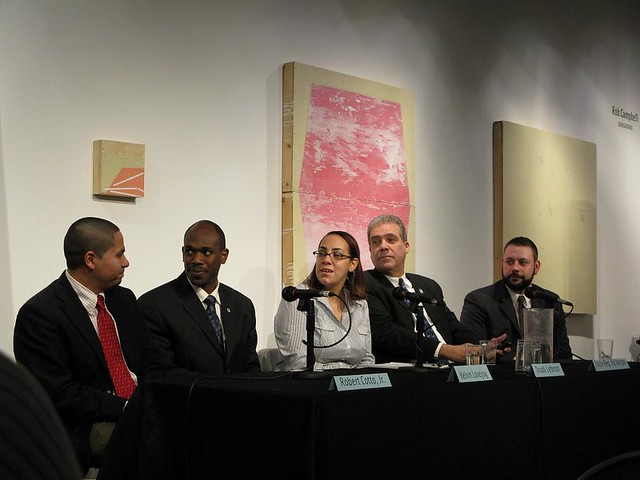
There’s no one way to do it, Trudi Lebron said, of how to educate our children. With one child at a Hartford public high school, another at a CREC school, and a third at a magnet, she knows something about this. Her child who attends Capital Prep Magnet School would not do well at Bulkeley High School, she said, and the one attending Bulkeley would not do well at Capital Prep. Children have different personalities, different needs. Education can’t be one size fits all.
This is one thread that emerged from the panel discussion on the current state of education; this followed a screening of American Promise at Real Art Ways last Sunday. The documentary film shows two families’ journeys through an elite private school in Manhattan. The two students’ families begin more-or-less in the same place — two-parent household, employed, and very involved in children’s lives — but the paths diverge. Both students struggle with the tremendous pressures placed on them to achieve, and as the film closes, we are shown both students ultimately being accepted into college.
But the film, as with most ways education is measured locally, fails in one major way: admission to college is viewed as an endpoint. This issue was touched on by some on the panel who saw focus on getting students into colleges, but little attention given to what happens after they set up their dorm rooms and begin the hard work.
In the film, we see what looks like the Dalton School attempting to counsel out both students, one more than the other. Michael Maziarz, a panelist who is also the Principal of the Hartford High Engineering Academy, said he “thinks that that happens” to students in Hartford schools. Although he did not name names, to anyone closely following what is happening in local education, it was obvious which schools he had in mind, as his next comment asserted that great school models can not just be replicated anywhere given the differing needs of the population.
Lebron, who has said that her child attending Capital Prep has benefited from the support services provided by the school’s staff, said “we need our public schools in place. When schools focus on a “marketing strategy,” she said, it “detracts” from actually teaching students.
State Rep. Edwin Vargas, Jr. agreed: “We should have models we can learn from, but that doesn’t mean we should be dismantling our public schools.”
Vargas criticized the Hartford Public Schools’ current management, saying “we have an outgoing superintendent [trying to give] away our public schools like candy.”
In many ways, this is a Hartford problem (though Bridgeport and New Haven might be thrown into the mix). Hartford school board member, Robert Cotto, Jr. said that “we have a shifting definition of what is public.” Citing how students have been made to walk in lines, wear special uniforms, be given harsh punishments for not wearing a belt, and more, he said that this kind of “institutional racism” happens in Hartford, “not West Hartford.”
Vargas, a former teacher, said that it has long since fallen out of fashion to track students within schools; they are not supposed to be sent, for instance, into college prep-level classes if they show potential but have only some parental involvement, while others with the same skill but more parental engagement are sent into honors-level classes. Yet, Vargas said, “for some reason” tracking is now allowed by schools as a whole. Though he did not elaborate, various teachers and parents have told me that the least engaged students are typically funneled into certain “academies” while others, with more parental involvement, may be directed elsewhere.
Kelvin Lovejoy, a panelist affiliated with Hartford Communities That Care, noted that “we have systems” where the gifted and talented students leave Hartford. Another issue, he said, is “not IQ, it’s EQ,” and “it goes back to community, back to home.”
The final Board of Education meeting for 2013 was last night. The next BOE workshop meeting is scheduled for Tuesday, January 7, 2014 at the Burns Latino Studies Academy, 195 Putnam Street. There will be discussion of the “Lighthouse School” and “Commissioner’s Network” at this meeting. The next regular BOE meeting will be on Tuesday, January 21, 2014 at the Journalism and Media Magnet Academy, located at 150 Tower Avenue. These meetings are open to the public.
